 As the landscapes of media and communication continue to evolve, the lines between news, opinion and entertainment are blurring quicker than society can vet facts. Thus, there seems to be confusion over what is unsafe and what is uncomfortable. While the two concepts are not mutually exclusive, it is imperative to understand that neither are they the same.
As the landscapes of media and communication continue to evolve, the lines between news, opinion and entertainment are blurring quicker than society can vet facts. Thus, there seems to be confusion over what is unsafe and what is uncomfortable. While the two concepts are not mutually exclusive, it is imperative to understand that neither are they the same.
While the two concepts are not mutually exclusive, it is imperative to understand that neither are they the same.
Politics and (some) Violence
In the United States, politics was established as the means by which problems can be addressed without violence. This places faith in a system, regulated by layers of redundancy in its checks and balances, to decide what measures to pursue that reflect the vox populi. One can guess that when the founders were composing the fundamental document to establish our government, they were still reeling from the echoing concussions of revolution. These men did not feel safe.
Rather, the founders probably felt correspondingly unsafe with the prospect of a disproportionate amount of power allocated to either the central government or the state governments. They felt unsafe with the potential uprising of a population of people who were kept as property based on their race. They felt unsafe due to the enormous financial debt incurred by the colonies for the economic costs of war. So, they designed such constitutional measures as separation of powers, the second amendment to the Bill of Rights, and a fractional reserve system of banking. What worked to preserve their safety at the time was, perhaps, shortsighted.
Two-hundred-thirty or so years later, our nation, devised in liberty and dedicated to the proposition that all men are created equal, has risen to a peak in global prowess that demonstrates the success of the system born of revolution, as well as showcasing its many flaws. History shows us that, when diplomacy fails and compromise is not pursued, violence fills the vacuum. While the argument can be made for the causes of political breakdowns to be many and complex, the most notable of them have been over race, war, and money.
Last Place Aversion in (presidential) Politics
The social phenomenon happening today has been increasing in frenetic urgency every four years, showing itself in the form of presidential campaign rhetoric. Fears are stoked and false equivalencies are pedaled. Now, as the locomotive of the Republican Convention barrels into the station as if driven by Casey Jones, the strategy has become clear. Donald Trump has tapped into the ugly effectiveness of the last place aversion paradox. Last place aversion is, to put it in extremely simplistic terms, the concept of relinquishing power to those with more, if it means preserving that power from those who have less. Following Donald’s speech, now more than ever, for Democrats to win this election against the nativist, hyper-nationalist, downright racist messaging of the Republican nominee’s pro-wrestling-style cheap-pop, they must focus all their campaigns -presidential and otherwise – on civil rights. In fact, all issues must be rooted in civil rights. That is an uncomfortable truth.
Last place aversion happens when uncomfortable is confused with unsafe. Self-preservation and self destruction look alike. The rest is just dressing one’s decision with self-serving justification to make it more palatable. Often such justification is fed to people by campaigns who would have people believe that politics is something worthy only of being the butt of a joke, or effective only when threatened with the barrel of a gun. This is thinly veiled by pundits and surrogates who use the word “establishment” with negative connotation, as if when they say it they want to laugh or spit. Just as familiarity breeds contempt, so does being an outsider fill voters with a sense of honesty and purity.
The Obama Coalition, consisting in large part of the growing minority population that makes up a reliable and vocal block of voters, ready to mobilize, and for whom this election is far too important to stay home, will be organizing and voting for the Democratic nominee. That, for some, is also an uncomfortable truth.
Trump in the Garden of Good and (mostly) Evil
Donald J. Trump has campaigned by exaggerating issues that make many people uncomfortable, thereby creating the illusion they are unsafe. Race in America is an uncomfortable conversation. Immigration is an uncomfortable conversation. Terrorism and religion is an uncomfortable conversation. Yet, by harnessing the manipulative aspects of the behavioral psychological phenomenon of attribute substitution, a process thought to underlie a number of cognitive biases (including stereotypes), Trump has tipped the scale away from many of these uncomfortable conversations. If addressed bravely and honestly by Americans, perhaps communicating on these issues would make the nation a safer place in the long run. Instead, Trump scapegoats the populations statistically facing the most real danger, painting them as the causes of danger for those who are likely to harbor biases and discomfort.
Described by Daniel Kahneman in his book, Thinking, Fast and Slow, attribute substitution is best explained as:
“When faced with a difficult question, we often answer an easier one instead, usually without noticing the substitution.”
Kahneman goes on to clarify the concept:
“An easy question (How do I feel about it?) serves as an answer to a much harder question (What do I think about it?).”
Many Americans prefer not to think about “it” at all. In spite of the fact that the average (white) American is far more likely, statistically to die of heart disease than by Islamic terrorism, he is still more likely to stare suspiciously at the Middle Eastern-looking gentleman at the ballpark, while eating a second hot dog and drinking a 32 ounce Mountain Dew. That same person may complain about “Mexican illegals” taking American jobs, after leaving his empty cup and hot dog wrapper on the ground to be cleaned up by a tax paying, undocumented, Ecuadorian immigrant – a job the average (white) American would never accept. Then, he may confidently drive home, in excess of the speed limit, knowing if he gets pulled over, he will be able to afford the speeding ticket. The average (white) American takes for granted that, were he stopped, he would not be shot by the police officer.
It was to an audience, made almost exclusively of this average (white) American, to whom Trump addressed his speech, describing a thousand points of darkness. In the city in which Tamir Rice was killed for holding a toy gun, Trump talked about being the law and order candidate. Simultaneously, white nationalists and open-carry enthusiasts brandished real firearms absent of police interference. Because, the problem, according to Trump, was everyone except his audience. To call on his audience to look within themselves and discern whether or not they enjoy privilege that others lack, would make them extremely uncomfortable. The only ask he made of his audience was to vote to put him in charge and let him speak for America. Because, only he alone can solve the scourge of lawlessness which he blames on everyone except himself and his supporters. That is not only wholly illogical, it is decidedly unsafe.
(not) Voting Your Conscience
Come November, Americans will vote their individual consciences. One might argue that, based on the collective conditioning of attribute substitution and its influence on people’s cognitive biases, people who “go with their gut instinct” are just as often wrong as they are right. Yet, just as likely is that voters have already made their decisions and are simply seeking justification for the choice that makes them most comfortable. Another quote by Kahneman goes:
“We think, each of us, that we’re much more rational than we are. And we think that we make our decisions because we have good reasons to make them. Even when it’s the other way around. We believe in the reasons, because we’ve already made the decision.”
Voting one’s conscience makes one feel comfortable. Perhaps it may be better to truly weigh the facts and the potential consequences before voting.
Of course, this unsolicited advice is not directed at you. I’m certain your choice will be weighed, measured, and not be found wanting for that which is best overall for the nation’s most vulnerable and the longest and most balanced period of peace and prosperity.
Politics is not the enemy. It is the process by which America solves its problems, albeit slowly and uncomfortably, without resorting to violence.
]]>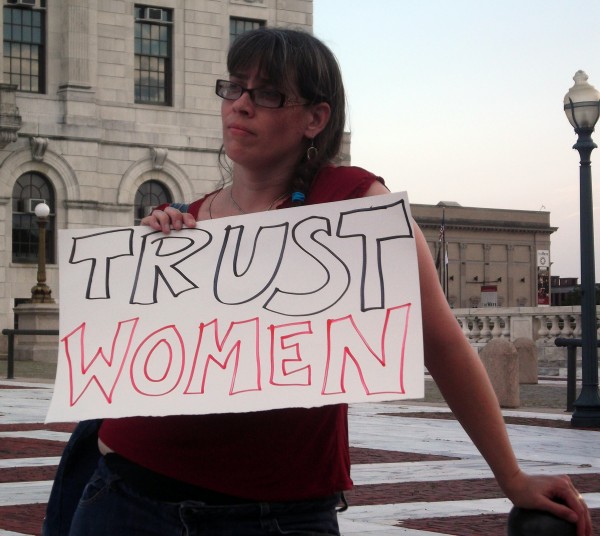 A funny thing occurred to me on the way to the State House. Okay, it wasn’t that funny, at all. It was about abortion.
A funny thing occurred to me on the way to the State House. Okay, it wasn’t that funny, at all. It was about abortion.
I was preparing to give testimony at the annual RI House abortion / choice exercise (hearing) last week when two facts or arguments occurred to me that happen to support my pro-choice position. The first is that a potential-father’s contribution to the mass of a fetus just before birth is miniscule, so he has no say in what the woman decides to do. The second is that forcing a woman to give birth is a form of rape.
Hear me out.
To my first point, we can see that the man’s contribution to a potential birth is about nil by looking at the science. A sperm cell weighs about 4.9 x 10^-14 lbs (mass = 22 picograms). The weight of a just pre-birth fetus averages about 7.5 lbs. So the father’s ‘part’ of the fetus versus the Mother’s part is about one in 155 trillion. Put another way, about 99.999999999999% of the fetus is from the mother. Therefore it only makes sense that the man should have little to say about anything having to do with the fetus. Note: spousal consent is no longer required nationally, but a Rhode Island state law to that effect is still on the books. Should the national ruling be overturned by the US Supreme Court, the RI law would take affect.
To my second point, that forcing a woman to give birth is a form of rape, what else can we call it? The state would be forcing a woman to create human tissue against her will. And then forcing her to expel it via the vagina. The state would force something through a woman’s vagina? Doesn’t sound too good to me; sounds like rape. Either the creation-of-tissue aspect or the expulsion part is anathema to the nation’s fundamental sense of personal freedom.
Similarly, any attempt to aid in a forced birth makes someone an accessory to rape or guilty of attempted rape. This means that any regulation or law aiding or abetting forced birth makes the state complicit in rape. For example any law requiring “informed consent” before an abortion falls into this category.
No, it really wasn’t all that funny.
Uhtime No. 3
]]> If you’ve ever wanted to make a difference in the fight to protect and promote civil liberties right here in Rhode Island, advocating at the State House is a great way to make your voice heard.
If you’ve ever wanted to make a difference in the fight to protect and promote civil liberties right here in Rhode Island, advocating at the State House is a great way to make your voice heard.
The 2016 General Assembly is in full swing and lawmakers are considering hundreds of important pieces of legislation that could have serious impacts on our rights. The ACLU of Rhode Island is at the State House nearly every day to weigh in on these bills, and having civil libertarians like you behind us truly makes a difference. That’s why we want to teach you how to be a better advocate!
This Saturday, February 20, advocates and two former lawmakers will lead an ACLU Advocate Training Session at the Warwick Public Library at 2:30 PM to share their experiences and advice on how to make your voice heard in Rhode Island. After the afternoon session, you’ll be ready to follow important civil liberties legislation; reach your legislators; connect with fellow advocates; and testify before committees. If you can’t make it this Saturday, the ACLU will host another training at the Rochambeau Library on Saturday, February 27 at 1 PM.
You don’t need any prior experience to learn how you can make Rhode Island a better place for your family, friends, and neighbors!
Join ACLU advocates and volunteers on:
2:30 to 4 PM
600 Sandy Lane Warwick, RI 02889
OR
1 to 2:30 PM
708 Hope Street Providence, RI 02906
No experience necessary. All are welcome.
]]> oin the ACLU of Rhode Island and the Brown University Chapter of ACLU-RI on Thursday, February 4, for a free screening of Citizenfour and a discussion of surveillance and privacy in the digital age.
oin the ACLU of Rhode Island and the Brown University Chapter of ACLU-RI on Thursday, February 4, for a free screening of Citizenfour and a discussion of surveillance and privacy in the digital age.
 Race and racism is the topic of discussion in the press. Yet it remains to be seen if this discussion will include the use of the dreaded c-word (class) or dare use the g-verb of what harms people of color daily (gentrification). Here at RIFuture, we want to spice it up a little and talk about those issues as part of a guide to activists in #BlackLivesMatter and other movements.
Race and racism is the topic of discussion in the press. Yet it remains to be seen if this discussion will include the use of the dreaded c-word (class) or dare use the g-verb of what harms people of color daily (gentrification). Here at RIFuture, we want to spice it up a little and talk about those issues as part of a guide to activists in #BlackLivesMatter and other movements.
We are approaching winter. I hope to suggest some books that activists can study amongst themselves so to better grasp how to radicalize their movements. Included on the list are suggestions by Antoinette Gomes of the Rhode Island College Unity Center, Ray Rickman of Rhode Island Black Heritage and Stages of Freedom, Jim Vincent of the NAACP, and Imam Farid Ansari of the Muslim American Dawah Center of Rhode Island, who has a background as a member of the Nation of Islam. Although these individuals have contributed to this list, the politics of volumes I suggest should not be construed as their own nor should my comments connected to my suggestions be conflated with their views. I would also be remiss if I did not add that, even though I consider myself a white ally, the reality is that any person of color has a better understanding of these issues in their little finger than I might in all my years of research. This is not intended as anything other than polite suggestion.
- Lies My Teacher Told Me: Everything Your American History Textbook Got Wrong by James W. Loewen (Suggested by Antoinette Gomes)
- Citizen: An American Lyric by Claudia Rankine (Suggested by Antoinette Gomes)
- In the Matter of Color: Race and the American Legal Process: The Colonial Period (Race and the American Legal Process, Volume I)/Shades of Freedom: Racial Politics and Presumptions of the American Legal Process (Race and the American Legal Process, Volume II) by A. Leon Higginbotham (Suggested by Farid Ansari)
- The New Jim Crow by Michelle Alexander (Suggested by Jim Vincent)
- Between the World and Me by Ta-Nehisi Coate (Suggested by Ray Rickman)- A meditation on race in America.
- March: Book One by John Lewis (Suggested by Ray Rickman)- Congressman Lewis writes about his childhood and the beginning of his work in the Civil Rights Movement.
- The Autobiography of Malcolm X As Told to Alex Haley– This book remains a vital manual for understanding the inherent value of any member of a minority group. Despite the problems in the text caused by Haley’s intentional distortion of Malcolm X’s politics, it is a critical volume.
- A Lie of Reinvention: Correcting Manning Marable’s Malcolm X edited by Jared Ball and Todd Steven Burroughs- When Marable’s biography of the slain leader was published posthumously, the Left in America was stunned by its lunacy. Obsessed with tabloid sexuality issues and trying to say that Malcolm X prefigured the neoliberal Obama administration, it was roundly condemned by everyone who knew the truth. Several rebuttal volumes were published but I would argue this is perhaps the finest. There is a corresponding collection of media files featuring discussions with various Left African American scholars at Prof. Ball’s website.
- The Wretched of the Earth by Frantz Fanon– Fanon was lying on his deathbed and dictated the material to his wife as it was written. The book analyzes the decolonization and how oppressed peoples can reorganize their societies. The first chapter, titled On Violence, was a stunning riposte to pacifists.
- Black Skin White Masks by Frantz Fanon– Here the author writes a classic psycho-analytic dissection of racism and how it affects the victims.
- The Souls of Black Folk by W.E.B. Du Bois– The book that argued ‘the problem of the Twentieth Century is the problem of the color line’, something all the more relevant today. Du Bois spared no punches when he fired across the bow of Booker T. Washington and dared people of color to dream of something greater than the lives of vocational workers dictated by the Tuskegee Institute.
- John Brown by W.E.B. Du Bois– John Brown, the abolitionist martyr, was not the first to say Black Lives Matter, but when ‘he captured Harper’s Ferry, with his nineteen men so few/And frightened Old Virginnia till she trembled thru and thru’, the entirety of the United States was rocked so hard it caused a Civil War. I have previously written CounterPunch where I argue this is an essential volume for all white activists to read.
- Race and Racism: An Introduction by Carolyn Fluehr-Lobban- A fantastic volume that explains the intricacies and contradictions of race written by a longtime member of the Rhode Island Black Heritage Society who taught classes on this topic at Rhode Island College.
- Orientalism by Edward Said– A classic dissection of the notion of ‘The Orient’ as an imperialist construct.
- The America in the King Years Trilogy by Taylor Branch- Branch’s epic biography of Martin Luther King, Jr. has some flaws, especially considering his too-close-for-comfort relationship to President Bill Clinton, yet this is essential reading, especially the first volume, Parting the Waters.
- Hopeless: Barack Obama and the Politics of Illusion edited by Jeffrey St. Clair and Joshua Frank- This volume is a Left-progressive response to the Obama administration. It includes essays from radical African writers to poor white southerners who have been equally marginalized by the neoliberal policies of this president.
- Pedagogy of the Oppressed by Paolo Freire– This volume that argues for a re-definition of how teachers teach and students learn. Our charter school champions in the state and city governments could learn a thing or two from Freire.
- What Gandhi Says: About Nonviolence, Resistance and Courage by Norman Finkelstein- Finkelstein is originally a Marxist and advocate for the Palestinians. Yet he turned to Gandhi to develop a manual for the people he loves so dearly and ended up giving us all a gift, dedicating the book to members of Occupy Wall Street. He has no delusions about the Mahatma and is very open about this but also has some stunning insights to share.
- Communists in Harlem During the Depression by Mark Naison- A fantastic case study of liberation politics and a cautionary tale. The Communist Party had some truly brilliant moments, such as their campaign for the Scottsboro Boys, and some truly problematic ones.
- A Brief History of Neoliberalism by David Harvey– When you go to another country, you find political parties that have wildly different economic programs. Yet both the American Democratic and Republican Parties rely on identity and social issue politics to win votes. Why? The reason is that both parties subscribe to a brand of economics called neoliberalism, which dictates mass-privatization of public utilities, eradication of the social safety net, and austerity policies. Harvey presents a very readable and vital history of how America got to where we are today economically.
- Here I Stand by Paul Robeson- One-half memoir, one-half manifesto, this testament of the unabashed champion of his people, who faced censure from the McCarthyist mob in the 1950s, is a brilliant short collection of writings.
- Anarchism: From Theory to Practice by Daniel Guérin– A classic pamphlet that explains the basics of libertarian socialism and the history of a communist movement that values liberty in a fashion far more honest than the old Leninist tradition did.
- On Liberty by John Stuart Mill– Whenever one talks about rights and liberty, they consciously or unconsciously are invoking the ideas laid out by Mill.
- A People’s History of the United States by Howard Zinn– The author was open in his later years he made some mistakes and tried to impose a doctrinaire vision of class on the history of America that had some blind spots, including a gap regarding LGBTQQI people. Yet the book is so beautiful in some parts I still find myself misting up, especially when I read this passage:
There is no way of measuring the effect of that southern movement on the sensibilities of a whole generation of young black people, or of tracing the process by which some of them became activists and leaders. In Lee County, Georgia, after the events of 1961-1962, a black teenager named James Crawford joined SNCC and began taking black people to the county courthouse to vote. One day, bringing a woman there, he was approached by the deputy registrar. Another SNCC worker took notes on the conversation:
REGISTRAR: What do you want?
CRAWFORD: I brought this lady down to register.
REGISTRAR: (after giving the woman a card to fill out and sending her outside in the hall) Why did you bring this lady down here?
CRAWFORD: Because she wants to be a first class citizen like y’all.
REGISTRAR: Who are you to bring people down to register?
CRAWFORD: It’s my job.
REGISTRAR: Suppose you get two bullets in your head right now?
CRAWFORD: I got to die anyhow.
REGISTRAR: If I don’t do it, I can get somebody else to do it. (No reply)
REGISTRAR: Are you scared?
CRAWFORD: No.
REGISTRAR: Suppose somebody came in that door and shoot you in the back of the head right now. What would you do?
CRAWFORD: I couldn’t do nothing. If they shoot me in the back of the head there are people coming from all over the world.
REGISTRAR: What people?
CRAWFORD: The people I work for.
This list of books is not perfect and I do not pretend to that. I would be a fool not to note that there are almost no titles that deal with feminist issues and almost no women authors. I would in fact love to see Elisha Aldrich or another woman put together that list. But I hope that, armed with a curriculum that will keep these young people busy until spring, the winter will not kill the activist spirit as it did in the case of Occupy Providence. In the era of the charter school and cops who body-slam young women to the schoolhouse floor as if it were wrestle-mania, critical thinking in minority youths is a public enemy and democracy is the real terrorist threat. My hope and the hope of many is they will embrace their potential and create a big-tent movement that embraces labor unions, progressive religious bodies, women’s groups, LGBTQQI liberators, and a radical press to start a peaceful rebellion and win a bloodless class war.
]]>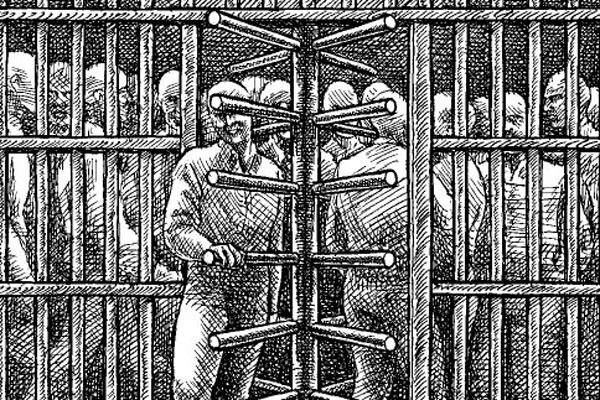 It is difficult, if not impossible, to pursue the goals of punishment at the same time as rehabilitation and reentry.
It is difficult, if not impossible, to pursue the goals of punishment at the same time as rehabilitation and reentry.
Probation is a punishment, and Rhode Island is a national leader in this form of punishment. As noted recently in the Providence Journal, the Governor’s workgroup is looking at ways to amend the state’s practices. Hopefully, any suggestions that pass the legislature or Department of Corrections are substantial and impactful. The crux of this, however, will depend on whether the state has an appetite to reduce punishments and thereby increase rehabilitation and reentry. Keep in mind that some people get sentenced directly to probation while others serve that sentence following a stint in prison.
As a former member and organizer with Direct Action for Rights and Equality (DARE) who has been serving a punishment for 22 years, I can tell you that many Rhode Islanders have been thinking long and hard about this topic, long before anyone could imagine a reduction in punishments for any offense. People are hampered in their attempts to live a productive life because of the crimes we have committed in the past, as there is a natural tendency to exclude us; however, this is reinforced by a probation status that serves to deny jobs, deny homes, deny education, and deny opportunities to help others.
DARE is the only membership-based grassroots organization in Rhode Island with a focus on criminal justice policies. Since forming our Behind the Walls committee in 1998, we are the only policy organization with formerly incarcerated people in leadership, and played a critical role in re-enfranchising people on probation and parole, reducing prison phone rates, ending mandatory minimum sentences, unshackling pregnant women, reducing employment discrimination with Ban the Box, ending probation violations based on dismissed new charges, and (soon) ending blanket discrimination in public housing.
As community members who are overwhelmingly impacted by criminal justice policies, we want to generate stability, support individuals and strengthen our community. Our membership is reflective of the low income communities of color that have the fewest resources to deal with unemployment, homelessness, mental illness, physical health, and substance abuse; i.e. the primary drivers of mass incarceration. Our community members are often both victims and perpetrators of crime, generally excluded from victims’ services once we are convicted. We live this issue, multi-generationally, in a state that has issued over 150,000 prison ID numbers in recent decades.
Ten years ago, DARE took an analytical approach to probation reform in Rhode Island. We knew the stories and lived the lives of people on probation. We recognized patterns of structural discrimination, financial hardship, and mental anguish that make it hard for any normal person to succeed. We recognize that probation is punishment, and the lengthy punishment of our family members, people living in our homes and raising our children, has been a disaster.
DARE articulated a four-point interlocking probation reform platform:
- Limit sentencing on violations to the time remaining on probation (Rule 32(f)). Thus, if one has a single day remaining on a 10-year probation term, they can only be sentenced to a single day. Whereas the status quo is that a judge may instead impose an entire 10-year suspended sentence, we believe this is not only morally flawed but also exceeds (in some cases) the statutory limits on certain crimes.
- Eliminate the 120-day limitation on filing a motion for a sentence reduction (Rule 35). Circumstances rarely change to justify a reduction within four months of the original sentence, yet when someone is serving a ten or fifty year sentence- they will often change over the years. Although the DOC can put some people on low supervision or banked status, their sentence has not ended for any of the structural discrimination purposes such as housing, employment, or volunteering. Nor are they free of the punishment’s mental and spiritual impacts.
- Extend Good Time to people on probation and parole (R.I.G.L. §42-56-24). This adjustment would have several effects, by (a) incentivizing good behavior, (b) naturally shortening sentences, and (c) allow probation officers and/or judges to take away earned Good Time for lower level infractions, similar to ACI discipline boards.
- Allow for violations to be dismissed where the new underlying charge is also dismissed (Rule 32(f)). This proposal passed the legislature after several years of advocacy. It was particularly frustrating when few people believed it was happening, and momentum shifted after Rep. Patrick O’Neill (a criminal defense attorney) interjected during a committee hearing that it is true: sometimes a new allegation comes along and within a few weeks the prosecutor offers a “deal” to plead guilty. If they don’t take the deal, then a maximum sentence on the probation violation is guaranteed. Defendants believe that guarantee, knowing the extremely low standard of guilt, eroded rules of evidence, and notorious cases such as Richard Beverly and Meko Lincoln. Both involved the dubious testimony of police officers ultimately revealed as criminals themselves. Most are “smarter” than Richard and Meko, accepting a few years in prison rather than risk lengthy violations.
These four reforms would reduce the number of people on probation, reduce the number of violations, incentivize good behavior, and allow people a better chance at a second chance.
There is no such thing as a second chance, a fresh start, or anything of the like while on probation. There has long been massive investment in low-income communities, however it has come in the form of police and prisons. Millions of dollars are spent in each neighborhood, although none of that money is an actual local investment. We are not widgets for processing, nor animals for study, nor wetlands to be saved. We are parents, children, brothers, sisters, workers, voters, and even policy experts.
We want a criminal justice system that can protect us without hurting us, where cages are a last resort, where punishments can end, and people can overcome their mistakes. We are the number one stakeholder in reducing overall crime and punishment, and reinvesting resources into affordable housing, jobs, education, along with a health care approach to addiction and mental illness.
I’ve long acknowledged that my sentence will never end, and do not take issue with that. I left Rhode Island to get an education, as my applications were rejected by Brown, URI, RISD, Salve Regina, Providence College, and Roger Williams Law School. Furthermore, several arts organizations, mentorships, and the Training School would not let me volunteer. Regardless of my own saga, Rhode Island needs to look at the systemic issues, and not isolate a few cases. To that end, the Governor would be well served to pick the brains of people who have lived these issues, from cradle to grave.
]]>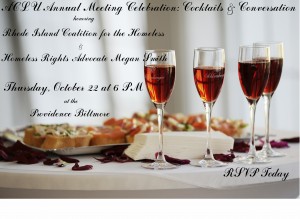 The ACLU of Rhode Island works tirelessly to defend fundamental rights here in the Ocean State. Now, it’s time to celebrate that work. Join us on Thursday, October 22, at the Providence Biltmore to take part in our Annual Meeting Celebration and raise a glass to another year of protecting civil liberties. This year, the ACLU of Rhode Island is honoring the Rhode Island Coalition for the Homeless and homeless rights advocate Megan Smith as the 2015 “Raymond J. Pettine Civil Libertarian of the Year” award recipients.
The ACLU of Rhode Island works tirelessly to defend fundamental rights here in the Ocean State. Now, it’s time to celebrate that work. Join us on Thursday, October 22, at the Providence Biltmore to take part in our Annual Meeting Celebration and raise a glass to another year of protecting civil liberties. This year, the ACLU of Rhode Island is honoring the Rhode Island Coalition for the Homeless and homeless rights advocate Megan Smith as the 2015 “Raymond J. Pettine Civil Libertarian of the Year” award recipients.
The ACLU of RI is honoring the Coalition and Ms. Smith for their unyielding advocacy for the civil rights and liberties of individuals experience homelessness, and for the invaluable support and resources they provide. The RI Coalition for the Homeless works to promote and preserve the dignity and quality of life for men, women, and children by pursuing comprehensive and cooperative solutions to the problems of housing and homelessness. Ms. Smith is an outreach worker and case manager with PATH, a program of the House of Hope CDC that works primarily with individuals experiencing street homelessness. Both are also tireless advocates for policies and reforms that affirm the rights of the homeless and protect individuals experiencing homelessness from discrimination.
ACLU supporters will mix, mingle, and enjoy hors d’oeuvres and cocktails while they celebrate the civil liberties successes of the past year and recognize the hard work of these two honorees dedicated to protecting the rights of the homeless.
ACLU of RI volunteer attorneys Sonja Deyoe, Carly Iafrate, and Neal McNamara will also provide updates on their ongoing and important court cases.
Celebrate your rights and freedoms, honor the RI Coalition for the Homeless and Ms. Smith, and support the ACLU of Rhode Island by purchasing your ticket today!
Tickets for the evening are $65 and are available for purchase online or by calling the ACLU office (401-831-7171). RSVP by October 14.
ACLU of Rhode Island’s Annual Meeting Celebration
Thursday, October 22 at 6 P.M.
(Registration begins at 5:30 P.M.)
Providence Biltmore
11 Dorrance St., Providence, RI 02903
Complimentary valet parking provided to all guests.
]]> The freedom to read is the freedom to learn, to imagine, to challenge your own beliefs, and to see the world from a new point of view. Too often, that freedom is challenged by individuals who would censor important and challenging books rather than embrace them.
The freedom to read is the freedom to learn, to imagine, to challenge your own beliefs, and to see the world from a new point of view. Too often, that freedom is challenged by individuals who would censor important and challenging books rather than embrace them.
As part of our ongoing work to fight against censorship in all its forms, the ACLU of Rhode Island is celebrating the freedom to read at our annual Banned Books Week Celebration on October 5.
Join us, the East Providence Public Library, and Living Literature for dramatic readings of Young Adult books that have been banned or challenged over the years.
Living Literature, a collective of Rhode Island-based artists and educators who teach literature through a unique and imaginative process, has created a 25-minute readers theater program exploring the question: “Why are Young Adult books challenged more frequently than any other type of book?”
Hear them perform selections from Harper Lee, Roald Dahl, Sherman Alexie, Lois Lowry, and Shel Silverstein and see if your favorite childhood book was ever banned or censored.
Banned Books Celebration: Young Adult Authors
October 5, 2015 at 6:30 PM
East Providence Public Library
41 Grove Ave., East Providence, RI 02914
This event is free and open to all. Light refreshments will be served.
]]>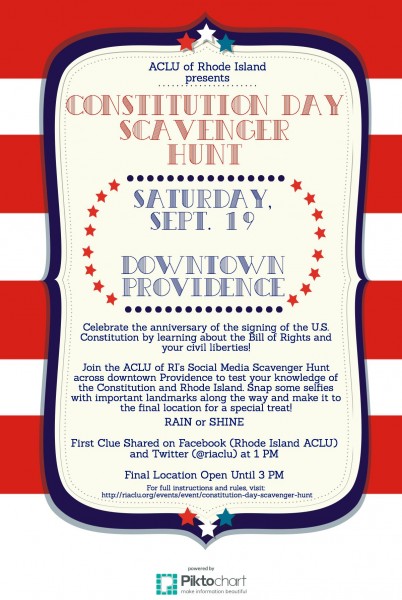 As the state’s strongest defender of your rights and freedoms, the ACLU of Rhode Island is excited to announce our plans to celebrate Constitution Day this week by hosting a family-friendly scavenger hunt highlighting Providence’s civil liberties history. Constitution Day marks the anniversary of the signing of the United States Constitution on September 17, 1787. Americans across the country observe the anniversary by teaching students about the Constitution and Bill of Rights. This year, the ACLU of Rhode Island is hosting a Constitution Day Scavenger Hunt on Saturday, September 19, to teach Rhode Islanders of all ages about civil liberties and local history.
As the state’s strongest defender of your rights and freedoms, the ACLU of Rhode Island is excited to announce our plans to celebrate Constitution Day this week by hosting a family-friendly scavenger hunt highlighting Providence’s civil liberties history. Constitution Day marks the anniversary of the signing of the United States Constitution on September 17, 1787. Americans across the country observe the anniversary by teaching students about the Constitution and Bill of Rights. This year, the ACLU of Rhode Island is hosting a Constitution Day Scavenger Hunt on Saturday, September 19, to teach Rhode Islanders of all ages about civil liberties and local history.
The family-friendly scavenger hunt will highlight Providence’s civil liberties history, and we hope the event educates the public, and especially children and teenagers, about the Bill of Rights and importance of knowing one’s rights.
So, think you know your Rhode Island history? Want to learn how the Constitution applies to everyday life? Put on your walking shoes and head to downtown Providence on your own or with your friends and family on Saturday, September 19, to start the hunt!
We’ll start sharing clues on our Facebook and Twitter at 1 p.m. (Rain or shine). Use them to start a self-guided hunt for landmarks around the city. Once you arrive at a stop, snap a photo (selfies are encouraged!) and share it on Facebook or Twitter with the hashtag #ConstitutionHunt. Make it to the final location to earn bragging rights and a small souvenir.
Constitution Day Scavenger Hunt
(RSVP On Our Facebook Page Here)
Saturday, September 19
1 to 3 P.M.
Downtown Providence
For more information and official rules, click here.
]]>“I speak as a governor and as a mother of two small children,” Raimondo said, “and I think we’ve all been troubled by the recent headlines all around this country about law enforcement.”

The governor added that this is a significant step in addressing a much larger problem, but said that she believes this will help keep communities safer, and make law enforcement more effective.
“Although this is an important piece of legislation, and one that is going to deliver real results, you all know this one bill isn’t enough. We must be actively engaged in our communities, and be committed to keeping our families and communities safe,” she said.
Representative Joseph Almeida (D- District 12), the main sponsor for the House version of the bill, said that it is a product of working for, and with, the people.
“You have two choices when you get elected,” he said. “You can be a politician and tell people what they want to hear, or you can be a legislator and tell them the truth. And that’s what we’re doing here.”
Senator Harold Metts (D- District 6), who was the Senate sponsor, spoke on how the bill will allow Rhode Island communities to heal with one another, and promote togetherness between communities and police officers.
“We were challenged to take our heads out of the desert sands of denial, and drink from the wells of equality, justice, and brotherhood,” he said. “Instead of having separation, and having the parties be polarized, they decided to work together. Instead of separation, we had collaboration.”
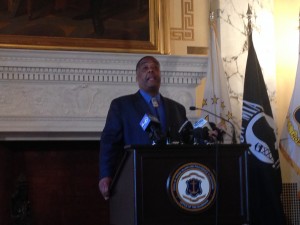
The act requires that law enforcement officers include in the ethnicity of the driver stopped, the reason, whether or not there was a search, and whether or not there was contraband taken from the vehicle in their traffic stop reports. It also prohibits officers from subjecting juveniles or pedestrians to a search without probable cause, and requires them to notify a driver why they are being stopped.
Colonel Steven O’Donnell, the superintendent of the Rhode Island State Police, said that the practices laid out in the Act are already happening.
“Almost all the information in that bill is something that State Police already do by policy. We’ve been doing it for years, so it didn’t take much to sit down with the community, and most of them we know very, very well,” he said. O’Donnell also gave credit to the House and Senate for being open minded about the subject of policing, particularly Senator Metts, who took part in the State Police Training Academy several years ago.
“Better training, better understanding, and better communication is really why that bill passed,” he said. “Everybody sitting down, some people losing some of their egos on both ends of the table, and coming to an agreement.”
Over the next 48 months, data will be collected from every traffic stop to determine whether or not there are racial disparities in Rhode Island’s policing system. Governor Raimondo said this data would be used to make informed decisions concerning the system.
“I think it’s clear there’s more that has to be done in Rhode Island and all around the country. You can’t look at what happened in Ferguson and South Carolina and think we’re doing enough, so what this bill says is that we’re committed to making changes based on facts, and making sure that our streets are as safe as possible, and that we’re protecting everybody’s civil rights in the process,” she said.
]]>